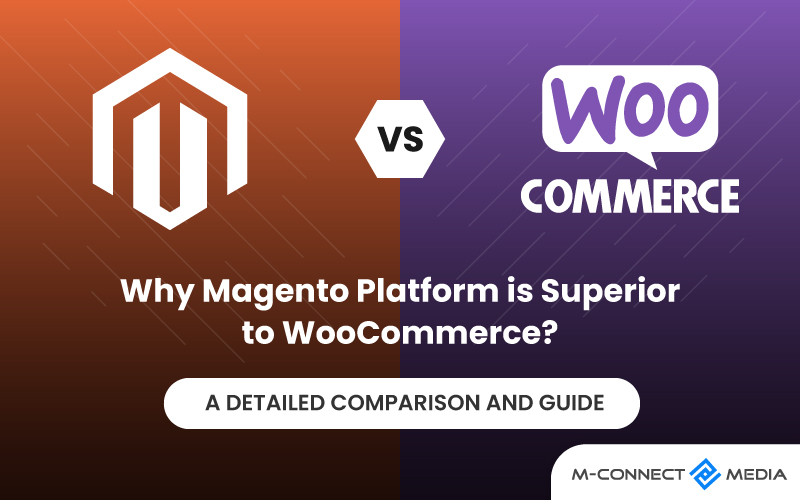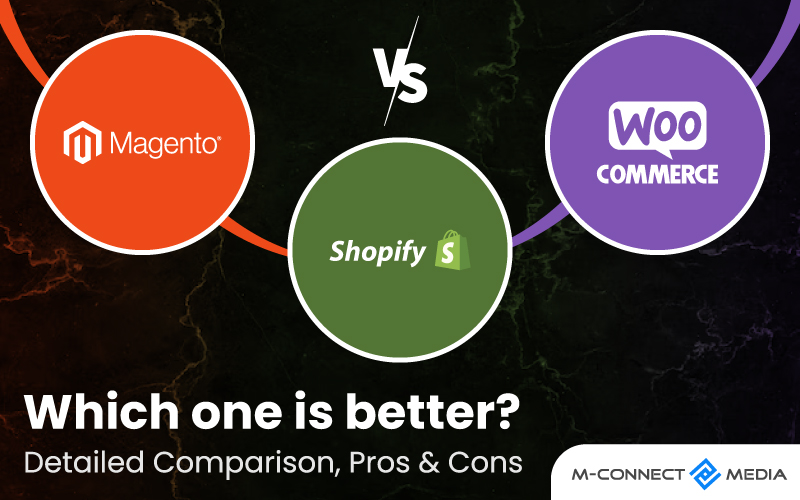WordPress excels in content management and blogging, while Magento specializes in robust e-commerce solutions. Each platform serves different needs effectively.
Choosing the right platform for your website is crucial. WordPress and Magento are leading options with distinct advantages. WordPress is user-friendly, versatile, and perfect for blogs and small businesses. Magento, on the other hand, offers powerful features tailored for large-scale e-commerce.
Understanding their differences helps in making an informed decision. WordPress boasts a vast plugin library and ease of use, ideal for those without technical skills. Magento requires more technical know-how but provides unparalleled customization for online stores. This guide will help you decide which platform best suits your requirements and business goals.

Platform Overview
Choosing the right platform for your website or online store is crucial. WordPress and Magento are two popular options. Each has unique features and benefits.
What Is WordPress?
WordPress is a widely-used content management system (CMS). It powers over 40% of all websites. WordPress is known for its ease of use and flexibility. It started as a blogging platform but has evolved. Now, it supports all types of websites, from blogs to e-commerce stores.
Key features of WordPress include:
- Easy to use: User-friendly interface for beginners.
- Customization: Thousands of themes and plugins available.
- SEO-friendly: Built-in features and plugins for SEO.
- Community support: Large community of developers and users.
WordPress is ideal for small to medium-sized websites. It offers flexibility and scalability. You can create a blog, portfolio, or online store with ease.
What Is Magento?
Magento is a powerful e-commerce platform. It is designed for large-scale online stores. Magento offers robust features for managing products, orders, and customers.
Key features of Magento include:
- Advanced e-commerce: Comprehensive tools for online selling.
- Customization: Highly customizable and scalable.
- SEO-friendly: Built-in SEO features for better visibility.
- Community support: Active community of developers and users.
Magento is ideal for large businesses with complex needs. It offers advanced features for managing large inventories and high traffic volumes.
| Feature | WordPress | Magento |
|---|---|---|
| Ease of Use | High | Moderate |
| Customization | High | Very High |
| SEO | Good | Excellent |
| Community Support | Large | Active |
| Ideal For | Small to Medium Websites | Large Online Stores |
Both platforms offer unique advantages. Choose the one that suits your needs best.
Ease Of Use
Ease of use is crucial when choosing a platform for your website. Both WordPress and Magento offer unique experiences. Let’s dive into the details.
User Interface
The user interface is how you interact with the platform. WordPress has a simple and intuitive dashboard. You can easily find menus and settings.
Magento’s interface is more complex. It has many options and settings. This can be overwhelming for beginners.
| Feature | WordPress | Magento |
|---|---|---|
| Dashboard | User-friendly | Complex |
| Navigation | Easy | Challenging |
Learning Curve
The learning curve for WordPress is gentle. Even beginners can master it quickly. There are many tutorials and support forums available.
Magento has a steeper learning curve. It requires more time and effort to learn. Advanced features need technical knowledge.
- WordPress: Easy for all users
- Magento: Suited for experienced users
Choosing the right platform depends on your needs and skills. WordPress is great for simple sites. Magento is ideal for complex e-commerce stores.
Customization Options
WordPress and Magento offer various customization options. This helps create unique websites. Let’s dive into the key aspects of customization.
Themes And Templates
WordPress has thousands of themes. Users can choose free or premium themes. These themes are easy to customize with the built-in editor.
Magento also provides a range of themes. These themes are more complex but offer extensive customization. Magento themes usually require coding skills to modify deeply.
| Aspect | WordPress | Magento |
|---|---|---|
| Number of Themes | Thousands | Hundreds |
| Ease of Customization | Easy | Moderate to Hard |
| Need for Coding | Minimal | Often Required |
Plugins And Extensions
WordPress boasts a vast library of plugins. These plugins help add features easily. You can find plugins for SEO, security, and more.
Magento uses extensions to add functionality. Magento extensions are powerful but can be expensive. They offer specialized features for e-commerce needs.
- WordPress: Over 50,000 plugins available.
- Magento: Thousands of extensions, many are premium.
Both platforms excel in customization options. WordPress is user-friendly. Magento offers robust e-commerce features.
Performance
Performance is a critical factor when choosing between WordPress and Magento. This section will delve into two crucial aspects: Speed and Scalability. Understanding these can help you make an informed decision for your website.
Speed
Speed significantly impacts user experience and SEO rankings. Both WordPress and Magento handle speed differently.
| WordPress | Magento |
|---|---|
| WordPress is lightweight and fast. | Magento has a more complex structure. |
| Many plugins can affect speed. | Requires proper optimization for speed. |
| Good for small to medium sites. | Better for large e-commerce sites. |
Scalability
Scalability determines how well your platform can grow with your business. Both WordPress and Magento offer scalability, but in different ways.
- WordPress:
- Scales well with proper plugins.
- Ideal for blogs and small shops.
- Magento:
- Designed for large-scale e-commerce.
- Handles high traffic and transactions.
Both platforms offer unique advantages. WordPress is great for content-heavy sites. Magento excels in large, complex e-commerce environments.
Seo Capabilities
Search Engine Optimization (SEO) is crucial for any website’s success. WordPress and Magento offer different SEO capabilities. Understanding these can help you choose the right platform.
Built-in Features
Both WordPress and Magento come with built-in SEO features. These features help you optimize your site for search engines.
| Feature | WordPress | Magento |
|---|---|---|
| SEO-Friendly URLs | Yes | Yes |
| Meta Tags | Yes | Yes |
| Image Optimization | Yes | Yes |
| XML Sitemaps | Yes | Yes |
Third-party Tools
Both platforms support a wide range of third-party SEO tools. These tools can enhance your SEO efforts.
- WordPress: Popular plugins include Yoast SEO and All in One SEO Pack.
- Magento: Popular extensions include Mageworx SEO Suite and SEO Toolkit.
WordPress offers user-friendly plugins. These plugins are easy to install and use. Yoast SEO is a top choice. It provides comprehensive SEO guidance.
Magento offers robust extensions. These extensions are powerful but may require technical knowledge. Mageworx SEO Suite is a comprehensive extension. It offers advanced features for large eCommerce sites.
Choosing the right platform depends on your specific SEO needs. WordPress is ideal for content-rich sites. Magento is better for large eCommerce stores.

Security
Security is crucial for any online platform. Both WordPress and Magento offer robust security features, but they handle it differently. Understanding their security measures can help you decide which platform suits your needs better.
Built-in Security Measures
WordPress and Magento both come with built-in security features. These features protect your site from common threats. Below is a comparison of their built-in security measures:
| Feature | WordPress | Magento |
|---|---|---|
| Core Updates | Automatic | Manual |
| Two-Factor Authentication | Requires Plugin | Built-in |
| SSL Support | Yes | Yes |
| Security Extensions | Available | Available |
| Data Encryption | Basic | Advanced |
Best Practices
Following best practices can enhance the security of your WordPress or Magento site. Here are some tips:
- Regular Updates: Keep your core, themes, and plugins up to date.
- Strong Passwords: Use complex passwords for your admin accounts.
- Two-Factor Authentication: Enable two-factor authentication for added security.
- Backup: Regularly back up your site to prevent data loss.
- Use SSL: Implement SSL certificates to secure data transmission.
By following these best practices, you can significantly improve your site’s security.
Cost
Understanding the cost differences between WordPress and Magento is vital. This section breaks down the initial setup costs and ongoing expenses for both platforms.
Initial Setup Costs
The initial setup costs vary between WordPress and Magento. Here is a detailed comparison:
| Feature | WordPress | Magento |
|---|---|---|
| Software | Free | Free (Open Source) / Paid (Magento Commerce) |
| Domain | $10 – $15 per year | $10 – $15 per year |
| Hosting | $3 – $30 per month | $10 – $50+ per month |
| Themes | $0 – $100 | $0 – $200+ |
| Plugins/Extensions | $0 – $100 | $0 – $500+ |
Ongoing Expenses
Ongoing expenses include maintenance, updates, and other recurring costs. The table below compares these expenses:
| Expense | WordPress | Magento |
|---|---|---|
| Hosting | $3 – $30 per month | $10 – $50+ per month |
| Security | $0 – $200 per year | $50 – $500+ per year |
| Maintenance | $0 – $500+ per year | $0 – $1,000+ per year |
| Extensions | $0 – $100 per year | $0 – $500+ per year |
WordPress is generally cheaper for initial setup and ongoing expenses. Magento might be costlier but offers extensive features for large businesses.

Customer Support
Customer support is crucial for any platform. It ensures users get help when needed. Both WordPress and Magento offer different types of support. Let’s explore them under two main headings.
Community Support
WordPress has a vast community. Users can find answers in forums, blogs, and tutorials. The WordPress community is active and helpful. You can join groups and ask questions anytime. This free support is ideal for beginners.
Magento also boasts a strong community. It includes developers, designers, and users. Magento forums are rich with solutions. Community members share tips, code snippets, and best practices. This support is invaluable for troubleshooting issues.
Professional Help
For more complex issues, both platforms offer professional support. WordPress users can hire experts for custom solutions. Many agencies specialize in WordPress development. You can find professionals on freelance websites too.
Magento provides dedicated support plans. These are available for different budgets. Magento support includes technical assistance and consulting services. This professional help ensures your store runs smoothly.
| Aspect | WordPress | Magento |
|---|---|---|
| Community Support | Large and Active | Strong and Resourceful |
| Professional Help | Freelancers and Agencies | Dedicated Support Plans |
Frequently Asked Questions
What Are The Main Differences Between WordPress And Magento?
WordPress is primarily a content management system (CMS), ideal for blogs and websites. Magento is an e-commerce platform designed for online stores. WordPress is user-friendly and versatile. Magento offers advanced e-commerce features. Both have their own strengths depending on the use case.
Which Is Better For E-commerce: WordPress Or Magento?
Magento is better for e-commerce due to its specialized features. It offers advanced inventory management, payment gateways, and scalability. WordPress, with WooCommerce, is suitable for smaller stores. Magento is ideal for large, complex e-commerce operations.
Is WordPress Easier To Use Than Magento?
Yes, WordPress is easier to use than Magento. It has a user-friendly interface and simpler setup. Magento requires technical expertise. WordPress is suitable for beginners, while Magento is more complex and powerful.
Can You Integrate WordPress With Magento?
Yes, you can integrate WordPress with Magento using plugins or custom development. Integration allows you to leverage WordPress’s content capabilities with Magento’s e-commerce strengths. This setup can offer the best of both platforms.
Conclusion
Choosing between WordPress and Magento depends on your specific needs. WordPress offers simplicity and flexibility. Magento excels in advanced e-commerce features. Both platforms have their strengths. Analyze your business requirements carefully. This guide aims to help you make an informed decision.
Happy website building!
